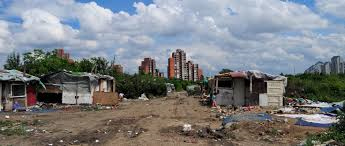Around 160 families, mainly Roma, are at risk of forced eviction in the ‘Numbered Streets’neighborhood of Miskolc, Hungary. The authorities must ensure that no one is forcibly evictedfrom their homes.The Municipality of Miskolc, plans to evict all its tenants from the “Numbered Streets” neighborhood in Miskolc, Hungary’sfourth largest city, to make way for a football stadium. At least two families have been given notice to vacate their homesby Monday 13 April and Thursday 16 April by a bailiff acting on behalf of the municipality. Others are expected to follow.
Speaking to Amnesty International’s delegate on 1 April, one resident who has been told to leave by Monday 13 Aprilsaid: “the whole thing is about the football, money and racism. They hate Roma people.”
The notices mark aresumption in evictions that were temporarily halted over the winter months, during which evictionsare prohibited by law. Prior to the evictions, around 900 mainly Roma people lived in the neighborhood. In May 2014,approximately half of the families received eviction notices. By the beginning of December 2014 around 30 families hadbeen evicted, without adequate genuine consultation or provision of alternative housing. Amnesty International havevisited the “Numbered Streets” neighborhood three times in the last nine months and met with municipal officersresponsible for carrying out the evictions in the neighborhood. The affected individuals report that genuine consultationson the eviction or the alternatives to it have not taken place; nor have they been provided with adequate alternativehousing. According to international human rights standards even where eviction is considered to be justified, it should becarried out in strict compliance with the relevant provisions of international human rights law.
PLEASE SEND APPEALS BEFORE 22 MAY 2015 TO:
Mayor of Miskolc
Mr Ákos Kriza
Városház tér 8.
Miskolc 3525
Fax: 011 36 46 347 807
Email: hivatal@miskolcph.huSalutation: Dear Mayor
Municipal representative in charge of the eviction
Dr. Schweickhardt Gyula
Városház tér 8.
Miskolc 3525
Fax: 011 36 46 348 801
Email: schw.gyula@miskolcholding.hu Salutation: Dear Dr. Schweickhardt
Gyula And copies to: Minister of Human Capacities
Zoltán Balog
Ministry of Human Capacities Akademia utca 3. Budapest 1054
Fax: 011 36 17 95 01 51
E-mail: miniszter@emmi.gov.hu
Also send copies to:
Ambassador György Szapáry, Embassy of Hungary 3910 Shoemaker St. NW, Washington DC 20008
Fax: 1 202 966 8135 I Phone: 1 202 362 6730 I Email: consul.was@mfa.gov.hu Please let us know if you took action so that we can track our impact!
EITHER send a short email to uan@aiusa.org with UA 83/15 in the subject line, and include in the body of the email the number of letters and/or emails you sent, OR fill out this short online form (press Ctrl +click on link) to let us know how you took action. Thank you for taking action! Please check with the AIUSA Urgent Action Office if sending appeals after the above date.
ROMA FAMILIES AT RISK OF FORCED EVICTION
ADDITIONAL INFORMATION
The Miskolc authorities began their attempts to erase the “Numbered Streets” neighborhood on 8 May 2014 when they decided to terminate rental agreements. The majority of residents of the neighborhood are currently at risk of being rendered homeless by the evictions without receiving any compensation. The municipality hasn’t involved the residents in
a meaningful consultation. Amnesty International wrote to the municipality on 14 July 2014 and met with the representatives of the municipality in October 2014.
As a state party to the International Covenant on Economic, Social and Cultural Rights (ICESCR) and other human rights treaties, Hungary is under an obligation to prohibit, refrain from and prevent forced evictions.
The UN Committee on Economic, Social and Cultural Rights has emphasized in its General Comment 7 that evictions may be carried out only as a last resort, once all other feasible alternatives to eviction have been explored. Even when an eviction is considered to be justified, it can only be carried out when appropriate procedural protections are in place and if compensation for all losses and adequate alternative housing is provided. Under international law, forced evictions and housing demolition must not be used as a punitive measure against people who lack residency or other status Moreover, under international human rights law, Hungarian authorities must ensure that an eviction does not directly or indirectly result in discrimination and inequality. While planning projects or considering evictions for any purpose, authorities must assess if any particular group is at higher risk of eviction. Hungarian authorities are in fact obliged to take positive measures to combat discrimination of improve security of tenure of marginalized groups, including the Roma.
Under the ICESCR, prior to carrying out any evictions the authorities must explore all feasible alternatives in genuine consultation with the affected persons. All potentially affected groups and persons, including women, ethnic minorities and persons with disabilities, as well as others working on behalf of the affected, have the right to relevant information, full consultation and participation throughout the entire process. They also have the right to propose alternatives that authorities should duly consider.
The UN Basic Principles and Guidelines on Development-based Evictions and Displacement (Basic Principles) require states to carry out impact assessments prior to the initiation of any project that could result in eviction and displacement.
Impact assessments must provide information about the area; the individuals affected, including information about their relationship with the location (for example their income generating activities), public services in the area etc. A consultation is only meaningful if it explores all the feasible alternatives to forced evictions. For example, where an eviction is sought because of non-payment of rent, consultations may result in an agreement allowing people more time to pay. Where evictions are planned because people live in unsafe housing, it may be possible to upgrade rather than demolish the properties.
Name: Families in the “Numbered Streets” neighborhood
Issues: Forced eviction, Legal concern, Economic social and cultural rights
UA: 83/15
Issue Date: 10 April 2015
Country: Hungary














